Most of the advice on Generative Engine Optimization (GEO) sounds the same generic tips anyone could copy‑paste. But here’s the catch: what works for an online shop won’t work for a hospital, a law firm, or a plumber in Nairobi. Yet, everyone’s reading the same cookie‑cutter guides.
That’s a problem because AI doesn’t treat all industries equally. A customer asking “best laptops for content creators in Kenya” won’t get an answer shaped the same way as someone searching “best lawyer for a land dispute.” If you follow a one‑size‑fits‑all strategy, you risk being invisible in the very spaces your customers are asking for help.
That’s why this Domain‑Specific GEO Playbook exists to show you how to unlock true value and stunning results in your industry. We’ll break down exactly how generative engines treat e‑commerce, healthcare, legal services, and local businesses differently and give you the GEO tactics that win in each vertical.
Why GEO Tactics Don’t Scale Equally Across Industries
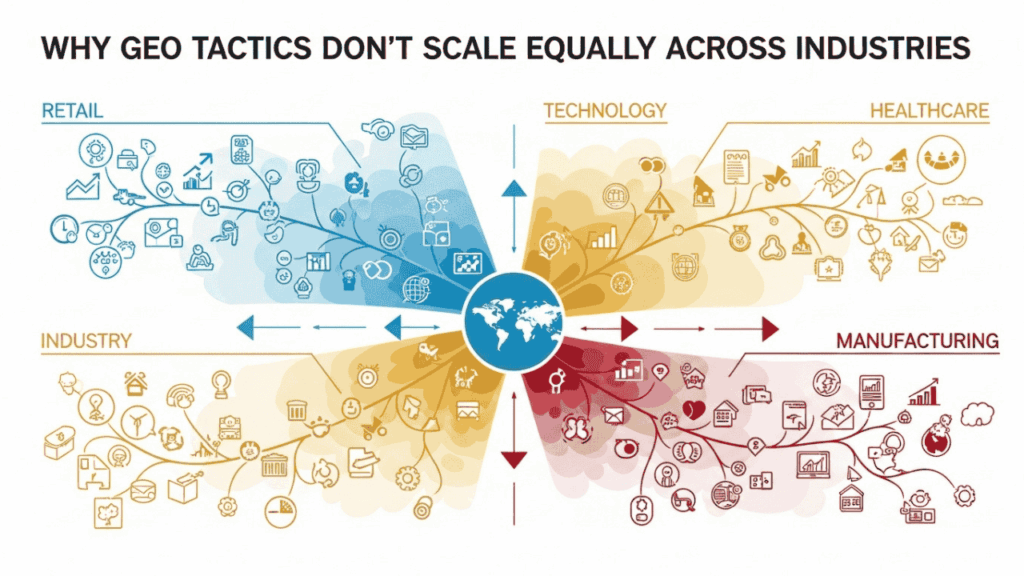
If you’ve read most guides on Generative Engine Optimization, you’ve probably noticed a problem: they treat GEO like it’s a copy‑paste job. But the truth is, AI doesn’t serve all industries the same way.
Think about it.
- A student looking up “best budget laptops under 30k in Kenya” expects side‑by‑side comparisons, clear specs, and price points.
- A parent asking “safest treatment options for childhood asthma” expects medically verified information with credible sources.
- A business owner typing “best law firm for land dispute in Nairobi” needs hyper‑local expertise, not generic definitions.
Generative engines like ChatGPT, Gemini, and Perplexity weigh different signals depending on the topic. They don’t just pull from the same set of rules they adjust based on the intent, trust level required, and content format most relevant to that industry.
That means a strategy that boosts an e‑commerce store won’t necessarily help a healthcare site and a legal firm can’t copy an e‑commerce playbook without losing credibility.
Bottom line is If you want true AI visibility, you need domain‑specific GEO tactics tailored to how generative engines process your industry.
The GEO Playbook for E‑Commerce
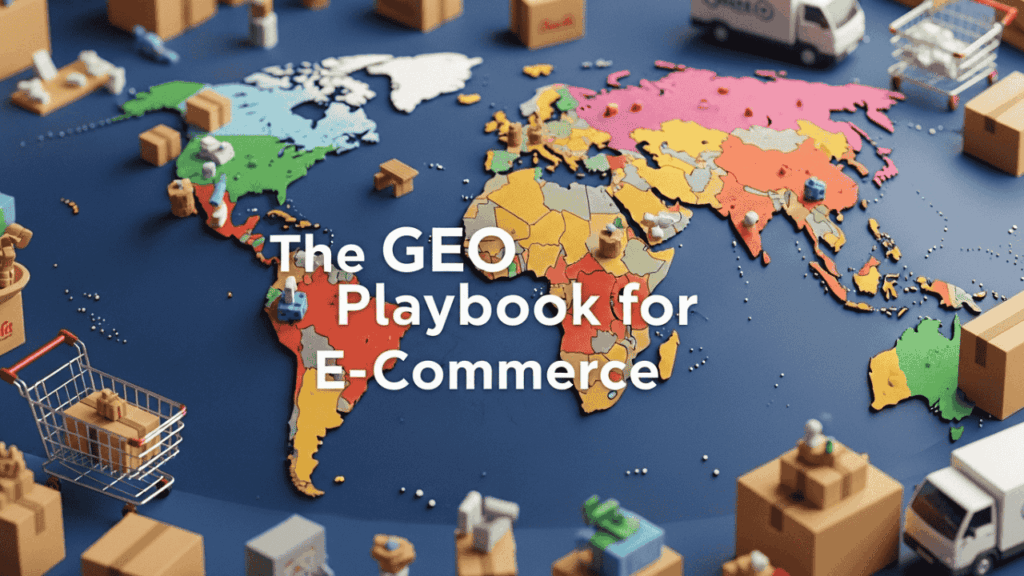
In e‑commerce, GEO isn’t just about being listed — it’s about being chosen in a single AI‑generated answer. Unlike Google search results where customers can scroll through options, generative engines give them one shortlist — and you either make it, or you don’t.
Here’s how to make sure your online store or digital product brand stays visible:
What AI Prioritizes for E‑Commerce
- Structured product data — Specs, pricing, and availability that AI can quickly parse.
- Direct Q&A formats — Example: “Is the HP Envy x360 good for content creators in Kenya?”
- Authenticity signals — Verified reviews, customer testimonials, and user experiences.
- Comparison‑friendly layouts — Side‑by‑side tables or lists that answer “best for” queries.
- Clear topical authority — A cluster of posts covering the full buyer journey: buying guides, hacks, FAQs, and reviews.
GEO Tactics That Work for Online Stores
- Build Q&A Product Blocks
- Write mini‑FAQs under each product.
- Example:
- “Who should buy this laptop?”
- “How long does the battery last?”
- “What’s the best alternative under 60k?”
These short, direct answers are citation candy for AI.
- Use Comparison Tables
- Simple HTML tables work best — AI can read them easier than images.
- Example: Compare 3 laptops under 30k with specs, pros, and pricing.
- Leverage Review Schema
- Add structured data that highlights customer ratings and testimonials.
- Generative engines love content that feels peer‑verified.
- Create Buying Guides for Every Budget & Persona
- For instance:
- “Best Laptops for Students in Kenya 2025”
- “Top Editing Laptops Under 90k”
- Each linked back to your product pages.
- For instance:
Quick Nairobi Example
Ask ChatGPT today:
“Best laptop under 60k in Kenya for video editing.”
Chances are, you’ll see a list with global brands — maybe HP, Lenovo, Asus. But unless you’ve built structured, review‑rich, question‑answering content, your brand won’t show.
A laptop seller could win here by:
- Publishing budget‑tier buying guides with Q&A blocks.
- Using comparison charts that AI can lift directly.
- Citing Kenyan market prices (a data point global sites usually miss).
That’s the visibility edge GEO gives local e‑commerce.
The GEO Playbook for Healthcare
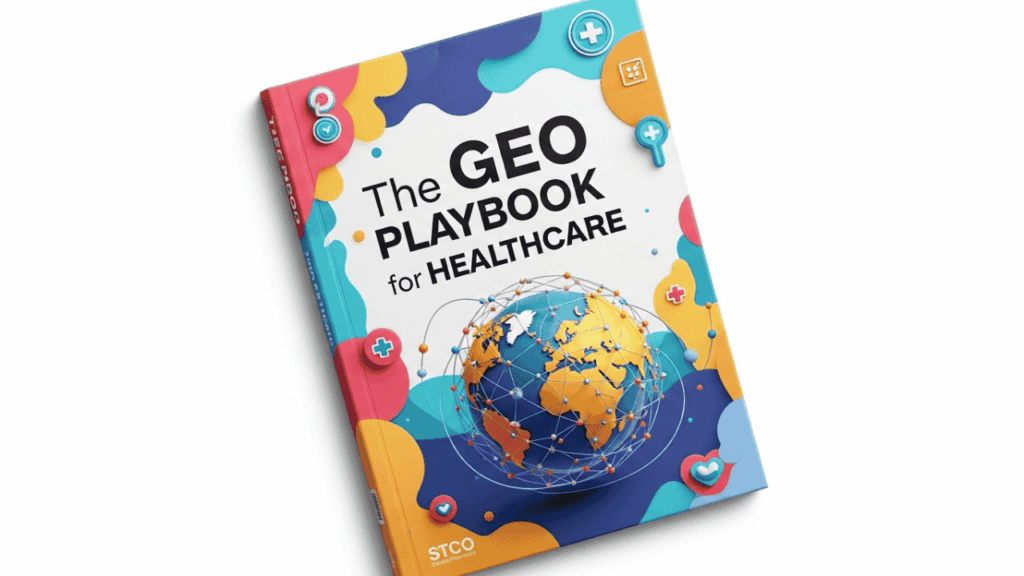
- Use Expert Bylines and Author Pages
- Every article should include the author’s credentials (e.g., Dr. Jane Mwangi, MD).
- Build a profile page listing qualifications, published works, and affiliations.
- Cluster Around Key Health Topics
- Create a main guide (e.g., “Understanding Diabetes in Kenya”)
- Link to subtopics: symptoms, treatments, diet tips, local clinics.
- This builds topical authority, which AI heavily favors in healthcare.
- Embed Evidence‑Backed Citations
- Link to WHO, Ministry of Health, PubMed, or trusted local health sources.
- Generative engines love content that’s citation‑ready.
- Add Patient‑Friendly Q&A Blocks
- Examples:
- “What are early signs of hypertension?”
- “Is telemedicine safe in Kenya?”
- “Where can I get affordable treatment for X?”
- Examples:
- Use Schema for Medical Content
- Add structured data like
MedicalWebPageorFAQPageschema so AI crawlers can validate accuracy.
- Add structured data like
Real‑World Application
If a Nairobi parent asks Gemini:
“Best hospitals for pediatric asthma treatment in Kenya”
They’ll likely see responses that include Nairobi Hospital, Aga Khan, or Kenyatta because those institutions have:
- High topical authority
- Strong web mentions
- Evidence‑backed pages
But a smaller clinic could compete if they:
- Publish condition‑specific pages with doctor bylines
- Use trusted medical citations
- Add clear Q&A sections to be AI‑citable
That’s the GEO power move: turning even smaller healthcare providers into trusted answers.
The GEO Playbook for Legal Services
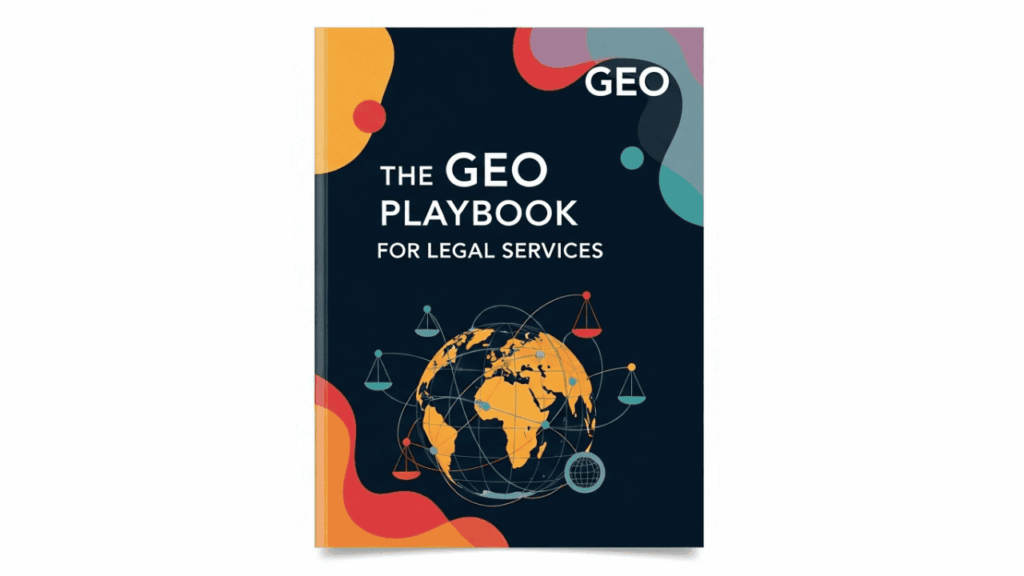
When it comes to law, credibility, clarity, and locality are the holy trinity. Generative engines know that a “land dispute” in Kenya isn’t handled the same way as one in the U.S. That’s why legal GEO is all about precision and geo‑specific trust signals.
What AI Prioritizes for Legal Services
- Geo‑localized expertise — Content tailored to specific counties, regions, or legal systems.
- Plain‑English definitions — Easy‑to‑parse explanations of complex legal terms.
- Contextual case content — Posts addressing “what to do if” scenarios.
- Consistent authority signals — Lawyer profiles, credentials, and citations from trusted legal bodies.
- Up‑to‑date accuracy — AI checks for timeliness, since laws change.
GEO Tactics That Work for Law Firms
- Publish Geo‑Specific Landing Pages
- Example:
- “Best Land Dispute Lawyer in Nairobi”
- “Tenant Rights Legal Services in Kiambu County”
- Add details on county laws, courts, and real‑world examples.
- Example:
- Build a Legal Glossary
- A to Z of legal terms relevant to your practice.
- AI loves structured definitions — they’re easy to cite.
- Answer “What If” Scenarios in Q&A Format
- “What should I do if I’m unfairly evicted in Nairobi?”
- “How do I register a business in Kenya legally?”
- Each answer should be clear, short, and linked to a service page.
- Show Lawyer Credentials Clearly
- Add bio pages for each lawyer with bar admissions, case history, and media mentions.
- This boosts authority signals for AI.
- Use FAQPage Schema
- Mark up common questions so generative crawlers recognize them instantly.
Real‑World Example
If you ask Perplexity today:
“Best lawyer for land disputes in Nairobi”
You’ll probably see answers pointing to big firms or government legal aid resources. Smaller firms won’t even make the cut — not because they’re not good, but because:
- They don’t have geo‑specific landing pages.
- Their content isn’t structured in Q&A format.
- Their lawyer credentials aren’t highlighted for AI trust signals.
A small Nairobi firm could win GEO visibility simply by:
- Publishing localized service guides
- Building a glossary of Kenyan legal terms
- Consistently updating content when laws change
That’s how even mid‑tier law firms get quoted in AI answers that matter most.
The GEO Playbook for Local Services
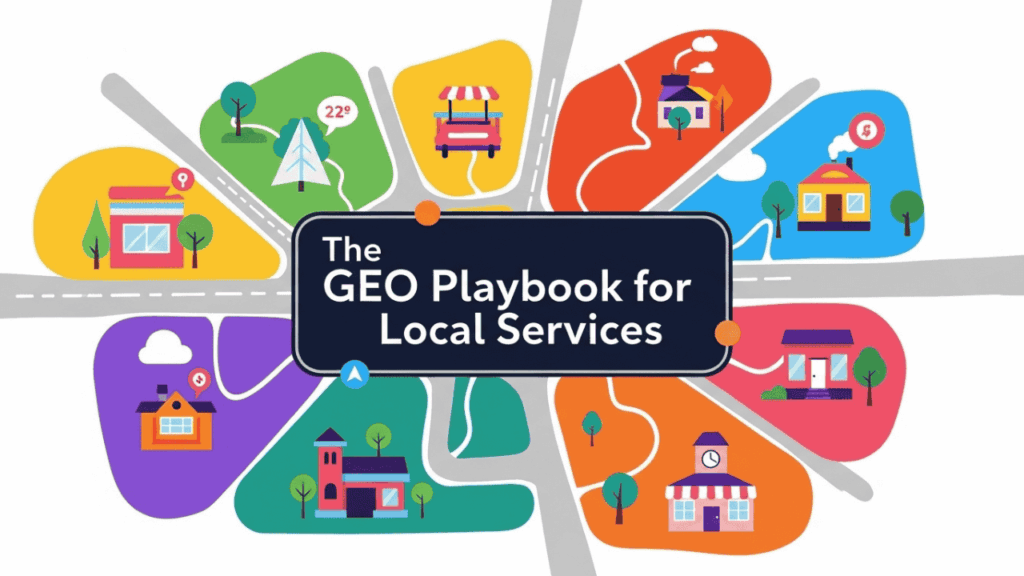
For local services, the battle isn’t global — it’s happening right in your neighborhood. Generative engines want to give people the closest, most trusted, and most reviewed options for their query. If you’re not actively signaling locality and credibility, you’ll get buried by bigger names or louder competitors.
What AI Prioritizes for Local Services
- Consistent NAP data — Your Name, Address, and Phone Number must match everywhere.
- Local reviews and mentions — Testimonials, Google reviews, and community forum chatter.
- Hyper‑local content — Blogs and FAQs that specifically mention your town, estate, or county.
- Directory and citation presence — Listings in trusted sites like Google Business Profile, local directories, and industry associations.
- Quick, actionable info — Service hours, pricing, and guarantees presented clearly.
GEO Tactics That Work for Local Services
- Build Hyper‑Local Q&A Content
- Example:
- “Best plumber in Westlands Nairobi”
- “Where can I repair a MacBook in Kilimani?”
- “Affordable wedding photographers in Mombasa”
- These should be written as mini‑blogs or FAQ entries.
- Example:
- Double Down on Reviews
- Encourage happy customers to leave Google reviews.
- AI tools cross‑reference reviews to validate trust.
- Use Consistent NAP Across Platforms
- From your website footer to Google Business Profile to online directories, your info must be identical.
- Get Cited in Local Forums & Groups
- Contribute to Nairobi business forums, WhatsApp groups, or even Facebook communities.
- These citations may be informal, but AI still picks them up.
- Optimize for “Near Me” Searches
- Include structured data like
LocalBusinessschema. - Add service‑area keywords directly into content.
- Include structured data like
Real‑World Example
Search Gemini for:
“Best laptop repair shop in Nairobi near me”
You’ll probably see Computer Planet, Eastleigh Computer Shop, or other high‑reviewed, citation‑rich businesses. But a small, skilled shop in Ngara or Rongai can still win by:
- Posting hyper‑local guides (e.g., “Affordable MacBook Repair in Ngara”).
- Gathering real customer reviews with photos.
- Ensuring consistent listings across directories.
Generative engines don’t care how long you’ve been in business — they care who’s sending the strongest local signals right now.
Domain GEO at a Glance
| Vertical | AI Priority | Core Tactic | Quick Win |
|---|---|---|---|
| E‑Commerce | Specs & comparisons | FAQ + schema + comparison tables | Add HTML side‑by‑side product charts |
| Healthcare | Safety & authority | Expert bylines + citations | Cite WHO, .gov, & peer‑reviewed sources |
| Legal | Geo‑context & clarity | Glossaries + local landing pages | Create legal Q&A blogs with FAQ schema |
| Local | Reviews & locality | NAP consistency + hyper‑local FAQs | Encourage Google reviews + LocalBusiness schema |
How to Test GEO Success Across Industries
It’s one thing to read a playbook — it’s another to know if you’re actually winning. Here’s a self‑audit worksheet you can use to measure your brand’s GEO visibility in your domain.
Step 1: Run Industry‑Specific AI Prompts
Ask ChatGPT, Gemini, or Perplexity questions your audience would ask.
- E‑Commerce: “Best laptop under 60k in Kenya for content creators”
- Healthcare: “Safest dental clinics in Nairobi”
- Legal: “What to do if I’m evicted without notice in Kiambu County”
- Local Services: “Reliable plumber in Westlands Nairobi near me”
Write down whether your brand shows up, is cited, or gets left out.
Step 2: Score Your Current GEO Signals
Use this quick scorecard (1 point per “yes”).
| GEO Factor | E‑Commerce | Healthcare | Legal | Local |
|---|---|---|---|---|
| Do you have Q&A content in your blogs/pages? | ☐ | ☐ | ☐ | ☐ |
| Is your site using structured data (FAQ, schema, LocalBusiness)? | ☐ | ☐ | ☐ | ☐ |
| Do your pages include authoritative citations? | ☐ | ☐ | ☐ | ☐ |
| Are expert bylines/profiles visible? | ☐ | ☐ | ☐ | ☐ |
| Do you publish geo‑specific or budget‑specific landing pages? | ☐ | ☐ | ☐ | ☐ |
| Do you actively gather reviews or testimonials? | ☐ | ☐ | ☐ | ☐ |
| Have you tested prompts in AI search to check visibility? | ☐ | ☐ | ☐ | ☐ |
Step 3: Interpret Your Score
- 5–7 points: You’re GEO‑Ready. Expect to start seeing traction in generative answers.
- 3–4 points: You’re in GEO‑Neutral. Good start, but competitors can easily outpace you.
- 0–2 points: You’re GEO‑Invisible. Right now, AI has no reason to mention your brand.
Step 4: Set a GEO Action Plan
- If you’re invisible: Start with Q&A content and schema markup.
- If you’re neutral: Add authority signals (reviews, citations, expert bylines).
- If you’re ready: Scale with topic clusters and routine AI prompt testing.
Final Word: Own Your GEO Future
Generative Engine Optimization isn’t a “nice to have” anymore it’s the visibility power move that decides if your brand survives the AI era.
Every industry plays by different GEO rules, but the principle is the same: become the brand AI trusts enough to recommend.
So here’s the challenge:
Run your audit. Find your blind spots. And start publishing content that puts you in the answer box not on the sidelines.
Because in the world of AI search, second place is invisible. Want to learn more about how to do SEO in this age, lets talk today.